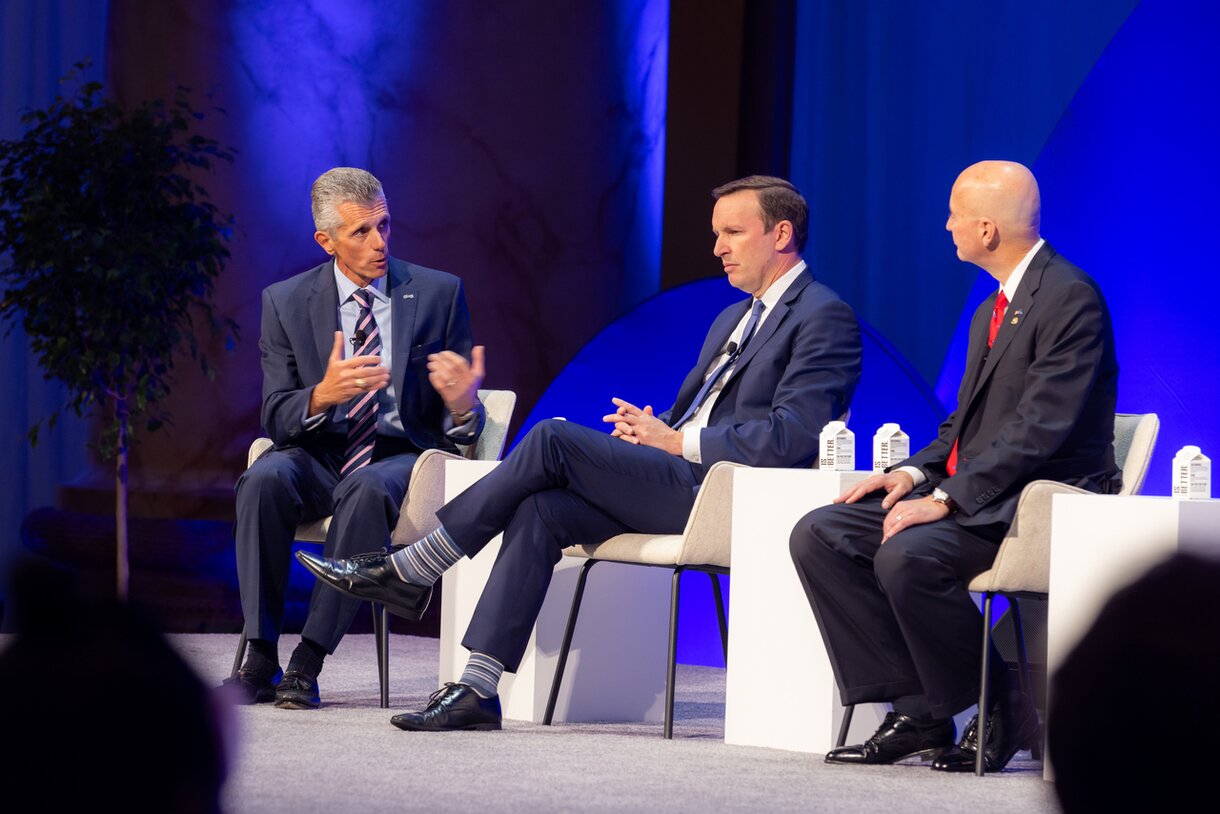Business Roundtable and The Cigna Group recently convened senior business executives, federal policymakers and community leaders for a Workforce Mental Health Summit. The discussion centered on the impacts of the mental health crisis and strategies to ensure a healthy and productive U.S. workforce.
The event was part of the Business Roundtable Mental Health Initiative, a CEO-led effort to help companies promote and support employee mental health, championed by David M. Cordani, Chairman and CEO of The Cigna Group.
CEOs from left to right: Julie Sweet of Accenture, Wayne Peacock of USAA and Blake Moret of Rockwell Automation
Watch the highlights here.
During the event, CEOs and government officials discussed the importance of building workplace cultures that support employee mental health and the need for public-private sector collaboration to mitigate the crisis. Panelists also shed light on companies’ efforts to promote mental health and how mental health challenges affect individuals, businesses and the economy.
On What Companies Can Do to Continue Improving Workplace Mental Health:
Cordani:
“Take your reflections, bring [them] back, take your own amplified microphone and your opportunities to drive less stigma, more openness and more opportunity because the products, programs and services that are available are meaningful. There is not an answer. There is not a silver bullet. There is a solution that works one community at a time. In the case of the employer community, each employer creates a community, which has a powerful multiplier effect.”
Julie Sweet, Chair and Chief Executive Officer, Accenture:
“Really build partnerships. The partnership we have with Cigna where we’re better because of the data and the insights, we could not do this alone. This is not our expertise. And I think in order to accelerate, trying to do this on your own doesn’t work. So, building the partnerships that allow you to better serve is really important.”
Wayne Peacock, President and Chief Executive Officer, USAA:
“Recognize our role to be a convener, to be a force for good in the communities where we work and live … If you can create an environment where people feel safe to be themselves, where they’re willing to talk about the challenges and issues that they have, you’re going to find more healthy employees, which is going to drive more productivity.”
Blake Moret, Chairman and Chief Executive Officer, Rockwell Automation and Chair, Business Roundtable Health and Retirement Committee:
“Work with your companies to work to increase the access to qualified care. And it’s something that between companies, with the government, with the people who are putting the plans together … to increase the access so that people know where they can go early on when they need help.”
Joshua Bolten, CEO, Business Roundtable:
“This is a critically important issue to every one of the CEOs in our organization. The depth of the mental health crisis in America is shocking in its human toll. There’s also an enormous business cost as mental health challenges undermine workers’ job performance and productivity. So, for so many reasons together we have an opportunity to dismantle stigma and build more support for the mental wellbeing of employees and their families.”
In addition to business leaders, Summit attendees heard from U.S. Senators Chris Murphy (D-CT) and Pete Ricketts (R-NE) during a fireside chat moderated by Cordani. The Senators discussed policies to address mental health challenges and support access to care and substance use disorder treatments.

About the Mental Health Crisis
- More than one in five U.S. adults and youths live with a mental illness, and 76% of U.S. workers in 2021 reported experiencing at least one symptom of a mental health condition.
- Beyond the profound personal impact, mental health challenges have far-reaching consequences on business that impact the whole economy.
- Missed work due to employee depression alone was estimated in a 2022 analysis to cost the U.S. economy $47.6 billion annually in lost productivity.
About the Business Roundtable Mental Health Initiative
In May 2024, Business Roundtable launched a new initiative to help companies promote and support employee mental health. The Business Roundtable Mental Health Initiative engages companies, outside experts and non-profit groups to discuss common challenges, identify best practices and develop innovative approaches for promoting supportive workplaces. The initiative provides Roundtable member companies with resources, training and other tools to complement their existing workplace mental health efforts. To learn more, click here.
Additional Resources
- Behavioral Health Business: Cigna’s David Cordani, Business Leaders and Lawmakers Zoom In on Mental Health Care
- HR Brew: Mental health and the need for benefits hit close to home for USAA
- FORTUNE: Business Roundtable announces new mental health initiative for employee well-being
- Business Roundtable Releases Mental Health Policy Recommendations
- Business Roundtable Supports Increased Access to Mental Health and Substance Use Disorder Services
- Business Roundtable Corporate Initiatives




